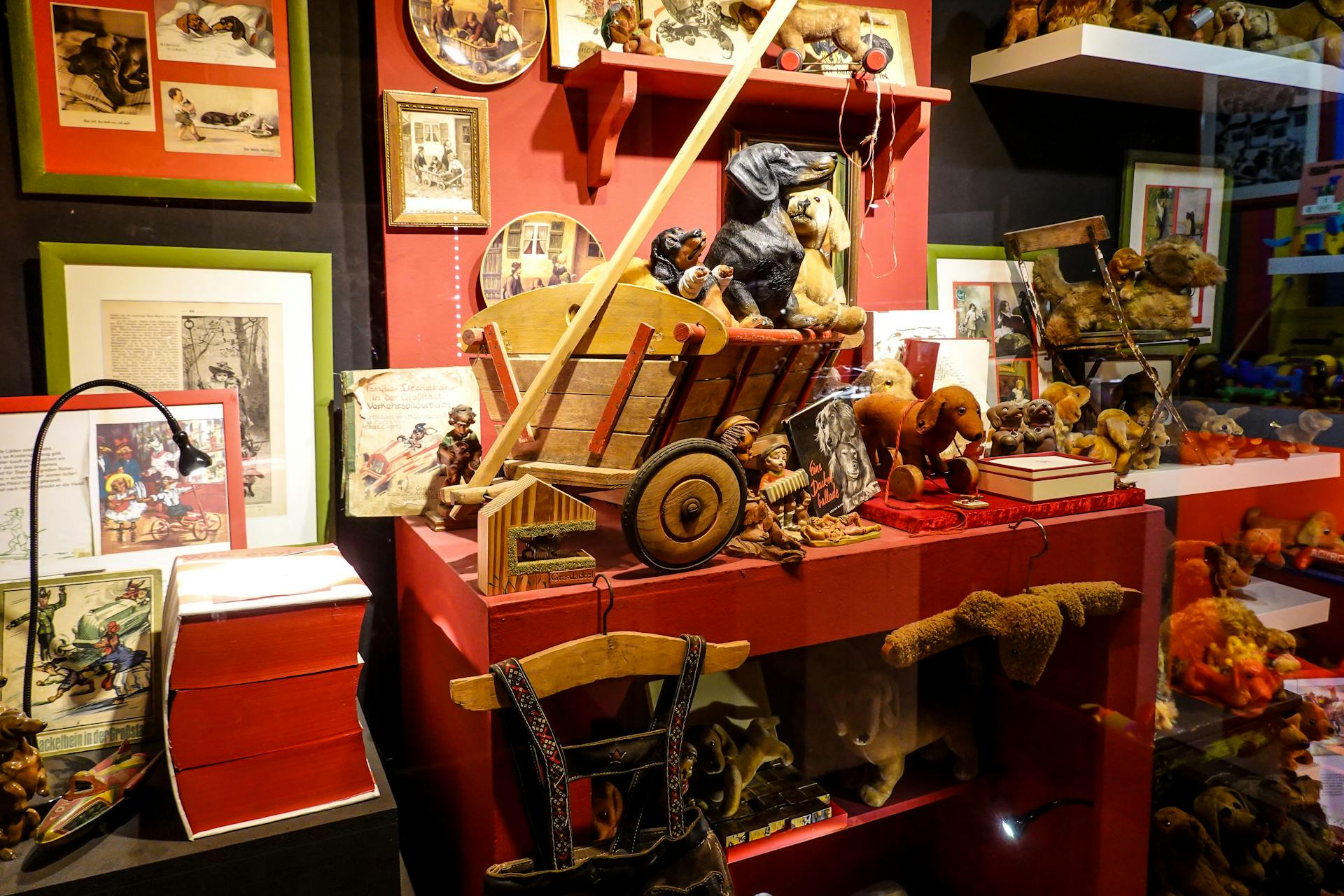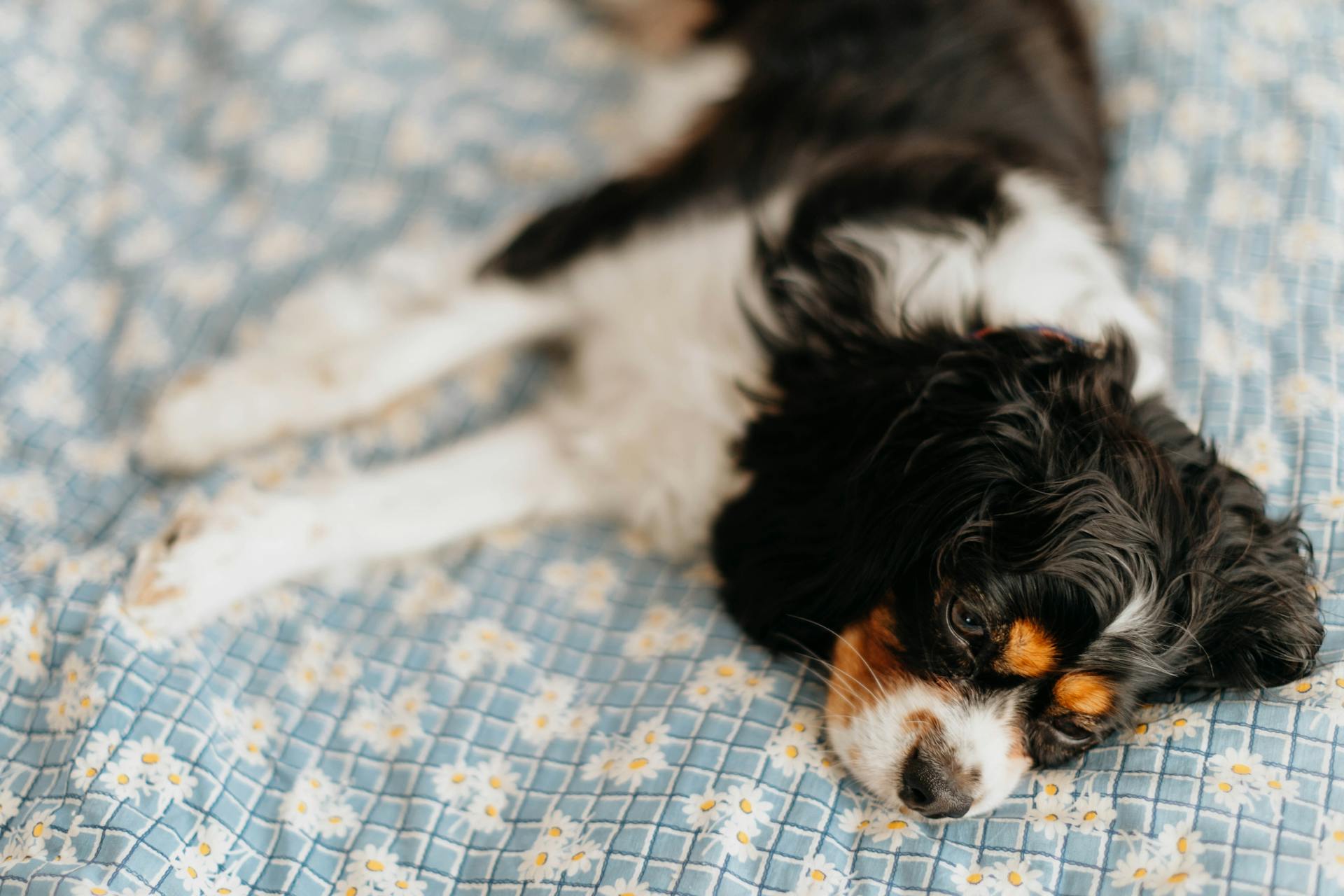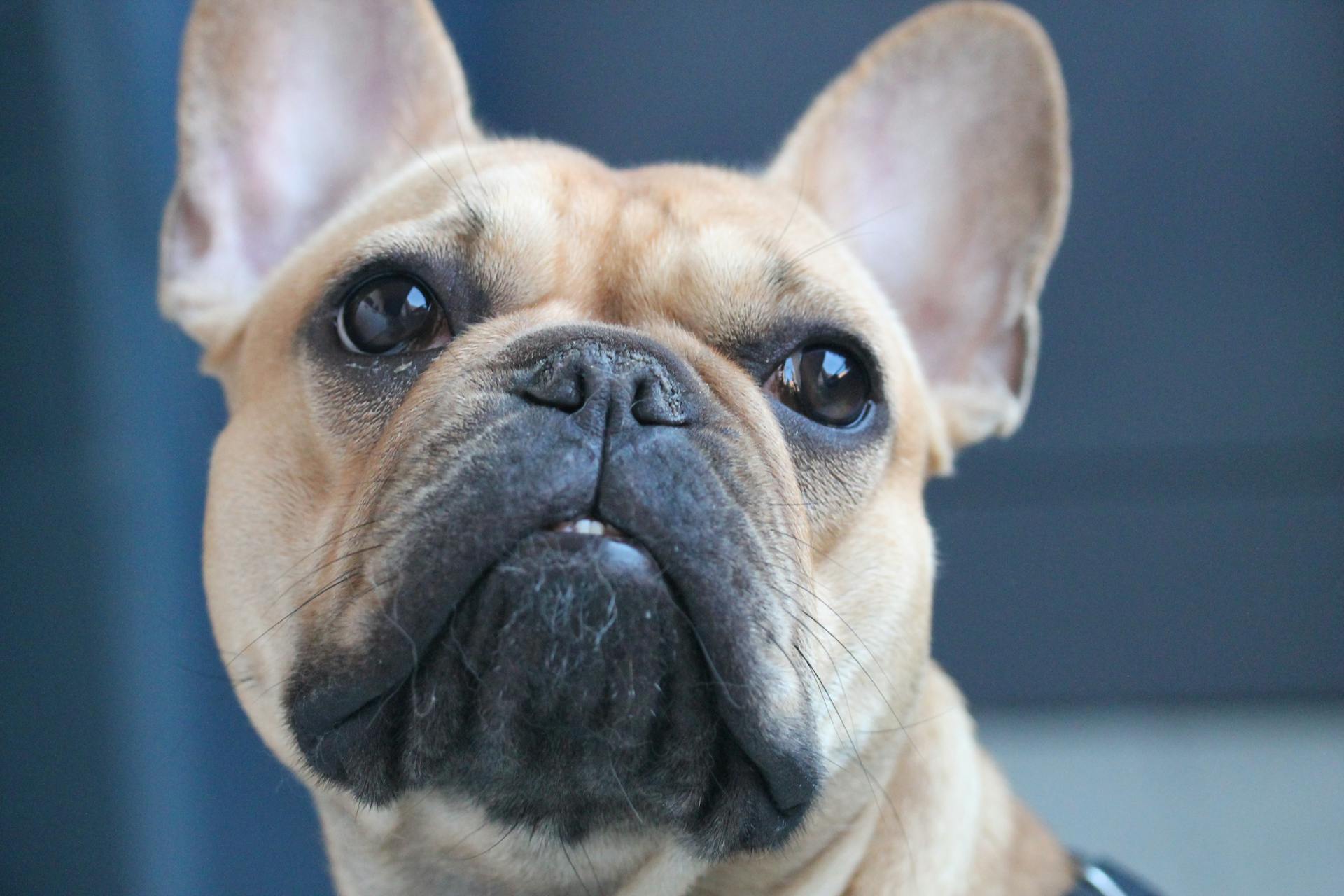
The Maltipoo is a popular hybrid breed that's gained a lot of attention in recent years. This adorable dog is a cross between a Maltese and a Poodle.
One of the biggest advantages of owning a Maltipoo is their low-shedding coat, which makes them a great choice for people with allergies. They require regular grooming to prevent matting and tangling, but it's worth the extra effort.
Maltipoos are known for being friendly and outgoing, making them excellent family pets. They're often described as gentle and affectionate, which makes them a great fit for families with children.
Their small size, typically weighing between 4-8 pounds, makes them a great choice for apartment dwellers or those with limited space.
Check this out: Great Pyrenees Pros and Cons
[Pros and Cons]
Maltipoos have some amazing benefits that make them fantastic pets. They're almost hypoallergenic, which is a huge plus for people with allergies.
One of the things I love about Maltipoos is that they have single-coat fur, which means they're low-shedding and require less grooming than many other breeds. They're also very small, making them perfect for apartment living.
Maltipoos are extremely friendly and outgoing, which is why they make excellent therapy dogs. They thrive on human interaction and love being around people.
Don't worry if you're not an avid exerciser - Maltipoos don't need high levels of activity to stay happy and healthy. They're happy with short walks and playtime.
Here are some of the key pros of owning a Maltipoo at a glance:
- Almost hypoallergenic
- Low-shedding
- Single-coat fur
- Very small, great for apartments
- Extremely friendly and outgoing
- Don't need high levels of activity
- Long lifespan (average is 14 years)
However, as with any breed, there are some downsides to owning a Maltipoo. They can be prone to separation anxiety, which means they might get distressed if left alone for too long.
Regular grooming is a must for Maltipoos, and it can be expensive. They also tend to bark more than many other breeds, which can be a consideration for noise-sensitive owners.
Potty training can be a bit of a challenge with Maltipoos, and they're prone to obesity if they don't get enough exercise. Oh, and they can have a tendency to smell bad if they're not cleaned regularly!
Test for Allergies Before Adoption
If you're thinking of adopting a Maltipoo, it's essential to test for allergies before making the final decision. You can spend some time with them in an enclosed area several times before adopting to see if you react.
Maltipoos have fine hair that doesn't shed heavily, causing far fewer allergic reactions than many other dog breeds. However, it's still possible to develop an allergy to them over time.
Some owners develop allergies long after living with their pets, so it's crucial to be aware of this possibility. You may need to consider adopting another Maltipoo puppy or a different breed if you do react.
If you do decide to adopt a Maltipoo and experience an allergic reaction, don't worry – there are ways to reduce or eliminate your symptoms.
Here are some things to consider when testing for allergies:
• Spend time with the Maltipoo in an enclosed area
• Observe your reaction and take note of any symptoms
• Consider adopting a different breed if you react
Remember, no dog is 100% hypoallergenic, including the Maltipoo. Every breed sheds its fur and dead skin cells, which can cause allergic reactions.
Breed Characteristics
Maltipoos typically grow to be around 14 inches tall and weigh between 5-20 pounds, making them a small dog breed. They have a medium to long length coat that's wavy or curly, and can be any color due to their diverse parent breeds.
Their appearance can vary, with bicolor, tricolor, or marbled coats possible. Dark solid color eyes with black rims are preferred, but black eyes and brown color are also common.
Maltipoos shed very little, which can make them a good choice for people with allergies. However, it's essential to note that there's no such thing as a hypoallergenic dog, and all dogs produce some dander and saliva.
Here are some key breed characteristics:
- Weight: 5-20 pounds
- Height: 14 inches
- Coefficient: Small dog breed
- Coat length: Medium to long
- Coat type: Wavy or curly
- Colors: Any color, but most commonly white and cream
Appearance
Maltipoos are small dogs that typically don't grow more than 14 inches tall.
Their weight can range from 5 to 20 pounds, making them a great fit for apartment living or for people who want a low-maintenance pet.
Maltipoos have a soft, medium-to-long length coat that's often wavy or curly.
Their coat can be just about any color, but they're most commonly white and cream.
Some Maltipoos may have bicolor or tricolor coats, while others may have a marbled coat.
As a designer breed, it can be tough to predict their exact appearance.
Maltipoos shed very little, which can make them a good choice for people with allergies.
However, it's worth noting that there's no such thing as a completely hypoallergenic dog, as all dogs produce some amount of allergy-inducing dander and saliva.
See what others are reading: Maltipoo Coat Types
Temperament
Maltipoos are gentle, affectionate, and fun-loving dogs that thrive on human interaction. They love to be around their owners and can get along with just about anyone, as long as they're properly socialized in puppyhood.
Their big personalities come from their Poodle parent, but they also inherit the Maltese parent's desire for love and cuddles. Marlene Kingston, a breeder and trainer, notes that each Maltipoo has a unique personality that's shaped by its individual parent breeds.
Maltipoos are alert and will bark at anything suspicious, but they're not aggressive dogs. They're great watchdogs, but their barking can be a problem if it's not controlled.
Here are some key temperament traits of Maltipoos:
- Gentle
- Affectionate
- Fun-loving
- Happy
- Alert
- Playful
- Outgoing
- Loving
These traits make Maltipoos excellent family dogs and therapy dogs. They're also great with other pets, but it's essential to socialize them properly to ensure they get along with everyone.
Similar Dog Breeds
If you love Maltipoo, you will definitely like these dog breeds as well. They share similar characteristics and traits that make them endearing to many dog owners.
Some of these dog breeds are similar to Maltipoo in terms of their small size. The Bichon Frise, for instance, is another small dog breed that is playful and adaptable.
The Cavalier King Charles Spaniel is another breed that is similar to Maltipoo in terms of its friendly and gentle nature. They are great companions for families with children.
The Shih Tzu is a small dog breed that is outgoing and affectionate, much like the Maltipoo. They require regular grooming to prevent matting and tangling of their fur.
The Poodle is a highly intelligent breed that is similar to Maltipoo in terms of its trainability and low-shedding coat. They come in various sizes, including toy, miniature, and standard.
Health and Grooming
Maltipoos are generally a healthy breed, but like all dogs, they can be prone to certain health issues. Their lifespan is typically between 10-13 years.
Some common health issues in Maltipoos include digestive issues, ear infections, allergies, skin irritation, and diarrhea. It's essential to be aware of these potential problems and take steps to prevent them.
A responsible Maltipoo parent should also consider the health issues of the parents, such as white shaker syndrome, luxating patellas, and allergies, which can be inherited by the puppy. Regular grooming, including nail trimming, ear cleaning, and brushing, can also help prevent skin infections and other issues.
See what others are reading: Maltipoo Health Concerns
Here are some key health and grooming considerations for Maltipoos:
- Health clearances through the Orthopedic Foundation for Animals (OFA) for patellas are recommended for both parents.
- Regular dental care, including a quality diet, dental treats, and brushing, can help prevent oral health issues.
- Use a vet-recommended ear cleaning solution to keep the ears dry and clean.
- Trim nails when needed to prevent overgrowth.
Health Problems
Maltipoos are prone to digestive issues, which can include diarrhea and other stomach problems. This is one of the top health concerns for Maltipoos, according to claims data.
Ear infections are another common health issue in Maltipoos, so regular ear cleaning is a must. This will help prevent infections and keep your Maltipoo's ears healthy.
Allergies are also a common problem in Maltipoos, which can cause skin irritation and other issues. If you suspect your Maltipoo has an allergy, be sure to consult with a veterinarian for proper diagnosis and treatment.
Skin irritation is often caused by allergies, but it can also be a symptom of other health issues. Keep an eye out for any signs of skin irritation, such as redness, itching, or scratching.
The average lifespan of a Maltipoo is between 10-13 years, which is relatively long for a small breed dog. However, regular veterinary care and a healthy lifestyle can help ensure your Maltipoo lives a long and happy life.
For another approach, see: Pros and Cons of Ear Cropping
Some Maltipoos may develop White Shaker Syndrome, a condition that causes tremors and lack of coordination. This is usually seen in white Maltipoos and can start as early as 6 months to 3 years old.
Here are some common health issues in Maltipoos, along with their typical age of onset:
Regular veterinary care and a healthy lifestyle can help prevent many of these health issues. Be sure to keep up with regular check-ups and follow your veterinarian's advice for keeping your Maltipoo healthy.
Grooming
Grooming is a crucial part of being a responsible Maltipoo owner. Regular grooming is essential to prevent skin infections at the root hairs.
Fleas can be a problem for Maltipoos, so it's essential to keep an eye out for them and ask your vet for the best flea treatment for dogs.
To keep your Maltipoo's coat in good condition, you'll need to brush it regularly. This will help prevent matting and tangling, which can be painful for your dog.
For more insights, see: Grooming a Maltipoo
Cleaning your Maltipoo's ears is also crucial to prevent infections. Use an ear cleaning solution recommended by your vet to keep their ears dry and clean.
Trimming your Maltipoo's nails is another important part of grooming. If you don't want to take them to a professional, you can use dog nail clippers.
Brushing your Maltipoo's teeth is also essential for their oral health. Use toothpaste recommended by your vet to keep their breath fresh and their teeth healthy.
Check this out: Maltipoo Teeth
Pet Ownership
Pet ownership can be a wonderful experience, but it's essential to consider the responsibilities that come with it. One crucial aspect to think about is the cost of owning a pet, which can range from $400 to $2000 for a Maltipoo, depending on the breeder or adoption route.
To give you a better idea, here are the estimated costs of owning a Maltipoo:
In addition to the financial costs, it's also important to consider the emotional demands of owning a pet. Maltipoos, in particular, are prone to separation anxiety if left alone for extended periods, so it's crucial to ensure they receive proper attention and care.
Owning a Pet
Owning a pet can be a life-changing experience, but it's essential to consider the pros and cons before bringing a furry friend home. Maltipoos, in particular, are a popular choice for many pet owners, but they do come with some unique characteristics.
Maltipoos are known for being low-shedding and having a single-coat fur, making them a great choice for people with allergies or who prefer less dog hair. They are also very small, which makes them perfect for apartment living.
However, Maltipoos do require regular grooming, which can be expensive. They also tend to bark more than other breeds, which may be a concern for some owners.
One of the biggest advantages of owning a Maltipoo is their friendly and outgoing personality. They make excellent therapy dogs and are great with kids. In fact, they are often considered one of the most affectionate dog breeds.
But, Maltipoos can be prone to separation anxiety if left alone for too long, so they require a lot of attention and interaction from their owners. They also need regular exercise and mental stimulation to prevent boredom and obesity.
Here are some estimated costs to consider when owning a Maltipoo:
Overall, owning a Maltipoo can be a rewarding experience, but it's crucial to be aware of their unique needs and characteristics before bringing one home.
Living Needs
Maltipoos are happy to live in apartments and smaller spaces, as they're not huge fans of being outdoors.
They still need daily exercise to burn out their energy, which is sometimes high.
Maltipoos are known to be noisy and will alert their family if they see or hear something out of the ordinary.
Consistent training is essential to teach them what's worth a bark and what's not, especially if they'll be living close to neighbors.
A gentle approach is necessary when training Maltipoos, as they're sensitive dogs that may shut down with aggressive tactics.
Positive reinforcement, plenty of treats, and play will speed up the training process and make it enjoyable for both the dog and the trainer.
Maltipoos get along well with almost anyone, including other animals and children, but may need guidance to know which toys are off-limits.
Supervision is required when small children are around Maltipoos, as they're small and fragile dogs that can be seriously injured if a child were to fall on them.
Additional reading: Crate Training Pros and Cons
Pet Feeding Frequency
Feeding your pet regularly is crucial for their health and well-being. It is advised to feed your Maltipoo at least 2 times a day.
Giving your pet one large meal a day can be detrimental to their health. This is especially true for small size dog breeds like the Maltipoo.
Small treats can be given in between meals and during training sessions to keep your pet satisfied and focused.
You might like: How Much Should a Maltipoo Eat a Day
Breed Availability
If you're looking to bring a Maltipoo into your family, you're in luck because they can be found through various channels.
You can start by contacting local or regional Maltese, poodle, or small-breed dog rescues if no Maltipoo-specific organizations are in your area. These groups usually take in Maltipoos.
Shelters and humane societies are another option, as many Maltipoos are still surrendered to shelters. Ask local animal shelters to notify you if a Maltipoo becomes available for adoption.
Reputable breeders are also a viable option, but make sure they're responsible and can provide detailed information about their litters, including health testing results and references.
Here are some ways to find a reputable breeder:
- They should be able to provide detailed information about their litters.
- They should encourage you to visit their home or kennel and meet the dogs.
Featured Images: pexels.com


